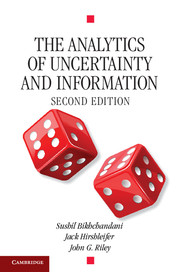Book contents
Introduction
The Economics of Uncertainty and Information
Published online by Cambridge University Press: 05 August 2013
Summary
All human endeavors are constrained by our limited and uncertain knowledge – about external events past, present, and future; about the laws of nature, God, and man; about our own productive and exchange opportunities; about how other people and even we ourselves are likely to behave. Economists have, of course, always recognized the all-pervasive influence of inadequate information, and its correlate of risk, on human affairs. But only in the period after the Second World War did an accepted theory of uncertainty and information begin to evolve. This theory provides a rigorous foundation for the analysis of individual decision making and of market equilibrium, under conditions where economic agents are unsure about their own situations and/or about the opportunities offered them by market dealings.
With recent explosive progress in the analysis of uncertainty, the topic can no longer be described as neglected. Nor have the advances been “merely academic.” The economic theory of uncertainty and information now flourishes not only in departments of economics but also in professional schools and programs oriented toward business, government and administration, and public policy. In the world of commerce, stock market analysts now regularly report measures of share-price uncertainty devised by economic theorists. Even in government and the law, formal analysis of uncertainty plays a role in dealing with issues like safety and health, allowable return on investment, and income distribution.
- Type
- Chapter
- Information
- The Analytics of Uncertainty and Information , pp. 1 - 4Publisher: Cambridge University PressPrint publication year: 2013



